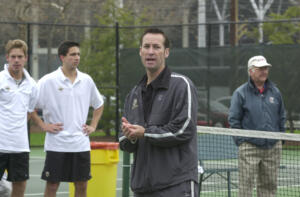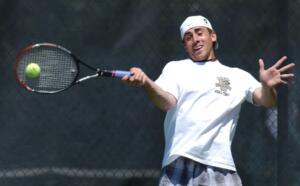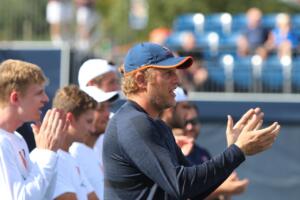Second to None
by Graham HaysThe men’s tennis team that nearly won Vanderbilt’s first NCAA team championship created a collaborative blueprint that’s as important today as it was 20 years ago
As lifelong friends who won three high school state titles together in Memphis, Zach Dailey and Lewis Smith understood each other as well as doubles partners can by the time they got to Vanderbilt. They understood each other’s strengths: Smith always had the bigger serve, but he often took a few games to settle down in a match. So if they won a pre-match coin toss, Dailey served first. The 2003 NCAA championship match against unbeaten Illinois was no different. Except, with the imposing stands at the University of Georgia looming over them, television cameras following them and history potentially on their rackets, everything was different.
Dailey stepped up to serve. And promptly double faulted three times in a row.
“I was a ball of nerves,” Dailey recalled. “I’ve never been so nervous in my life.”
The Vanderbilt duo dropped four of the first five games. During a changeover, initial nerves under control, Smith challenged his partner in no uncertain terms, “like a best friend would do,” Dailey chuckled. They cleaned up the mistakes and rallied to win their match, part of a Vanderbilt effort that settled for second place only after the Commodores pushed an opponent regarded as one of the best of all time to the final set of the final singles match.
Twenty years ago, the Vanderbilt men’s tennis team dared to go well beyond its comfort zone. In doing so, those student-athletes not only won the first SEC Championship title in team history but nearly went where no Vanderbilt team ever had. Three years before bowling’s first national title, and more than a decade before the VandyBoys and women’s tennis added to the trophy haul, the men’s tennis team played for Vanderbilt’s first team national championship. (Two years earlier, current Vanderbilt women’s tennis head coach Aleke Tsoubanos and her teammates also played for a title.)
The 20-year anniversary of that memorable run marks more than the story of a team that came tantalizingly close to making history. It offers an opportunity to revisit a story about how far it’s possible to come. From last place in the SEC just a year earlier, head coach Ken Flach and largely the same student-athletes proved that college tennis, unlike its professional counterpart, is the ultimate team game. As Scott Brown, one of their own, returns to Vanderbilt as men’s tennis head coach, history offers a blueprint for the future.
“That season and my entire experience at Vanderbilt taught me to have high expectations and unrelenting standards and a belief that, really, anything is possible,” Dailey said. “Ken Flach instilled that in us. He made us believe in ourselves. We brought out the best in each other. I’ve gone to business school, read leadership books and studied this firsthand as I’ve progressed in my career, and I still think that one of the top ingredients of a high-performing team is the chemistry within the group. And that’s a lesson that Vanderbilt tennis first taught me.”
A Mentor and Architect
Vanderbilt has had its share of accomplished coaches across the sporting gamut, but few were more decorated upon arrival than the late Flach. When hired in 1997, Flach was just a handful of years removed from a professional tennis career in which he won two U.S. Open and two Wimbledon doubles titles and Olympic gold in doubles. In just two years on the job in Nashville, he led the Commodores to the NCAA tournament for the first time since that event took on its current bracket format more than two decades earlier. But as a new century dawned, the ebb and flow of graduation left Flach looking to build the roster anew—in what would be his first opportunity to coach a team comprised entirely of his own recruits.
Dailey, Chad Harris, Smith and Bobby Reynolds arrived as freshmen in fall 2000. Brown arrived a year later. Together, they went from worst to first in the SEC and nearly all the way to a title, eventually joined by Michigan transfer Matt Lockin before the fateful 2003 season.

Ken Flach won back-to-back Wimbledon doubles titles in 1987-88 and U.S. Open titles in 1985 and 1993.
Several were recruited by programs with higher profiles at the time—Brown and Reynolds, for instance, were recruited by Illinois. Some of them had only a passing familiarity with Vanderbilt before the recruiting process began. Still, Flach’s credentials made it easy to believe in his vision for what he called a “unique” team that could grow together.
“With his background, he knew he could recruit and develop players,” Dailey said. “He did not lack confidence in anything that he did, and he knew that he could do it.”
Coming from the Atlanta area, Reynolds knew more about Vanderbilt than most because he counted men’s tennis alumnus David Drew among his early mentors. The connection helped, but Flach’s presence made the university’s other attributes impossible to turn down.
“I wanted to connect with the coach,” Reynolds said. “I wanted a coach who was going to mentor me and make me better. To what extent? I didn’t know. I also wanted a school that was going to provide me with the best education to set me up for when tennis was over. And, obviously, there was the attraction of playing in the SEC, which historically has always been the strongest conference for tennis and sports in general.”
Flach, who passed away in 2018, was intense—intensely competitive, intensely demanding, intensely caring. Of a generation with American tennis contemporaries like John McEnroe and Jimmy Conners, he could be fierce. Dailey referenced famously combustible basketball coach Bobby Knight as a comparison point, and others didn’t disagree with the assessment. But he was hardly a humorless martinet. Mired in a personal losing streak amid the team’s overall struggles in 2002, Smith recalled Flach approaching him after a match. Rather than a lecture, Flach sought to make the dejected sophomore laugh by putting a spin on an age-old sports cliche.
“He put his arm around me,” Smith recalled, “And said, ‘Lew, you win some, but you lose a lot.’”
He was above all a mentor, demanding excellence not for his own glory but for what he hoped was the best interest of long-term growth and development.
“I think the best way to describe coach Flach was he wore his emotions on his sleeve,” Reynolds said. “You knew if he was happy, you knew if he was mad, and usually rightfully so. He had high expectations. If you achieve what he achieved as a player, you have to hold yourself to a higher standard and want more. I think he brought that over to college tennis. But I would describe him as a player’s coach. You would show up for your hour of individual time with him, and sometimes you might practice and sometimes you might sit on the bench talking about life.”
As freshmen under Flach, Dailey, Harris, Reynolds and Smith helped the Commodores reach the NCAA tournament for just the second time in the modern era and advance to the second round. But for Brown, then coming out of high school in St. Louis, it was the intangible that drew him to Nashville. For athletes coming from youth ranks and potentially eyeing pro careers, college tennis is unique in its focus on team competition. Yet when Brown visited Vanderbilt, he found a core group that, despite its youth, acted like a team rather than a collection of individuals. He saw competition but also collaboration.
“I just felt really comfortable with them,” Brown said. “The team was close and young, and I felt like we would all be able to grow together, whereas some of the other teams I went to visit had a lot more juniors and seniors. Vanderbilt was the lowest ranked team I visited, but I just felt like these guys had something special and this team had potential.”
“I wouldn't change it for anything because we were able to put Vanderbilt on the map for college tennis. I don't think in the years previous to that anybody viewed Vanderbilt as a tennis school. Everything was so new and so much fun. Looking back, it was the right place for me to grow."
Bobby Reynolds
Last Place, First Steps
It turned out bonhomie and good vibes had their limits when someone was keeping score. Coming off 2001’s modest success, and with the well-regarded Brown added to the mix, Vanderbilt looked like an up-and-coming team in 2002—not least of all in its own estimation. Entering the season, the Commodores set goals. Lots of goals. Big goals.
They instead finished last in the conference. Rather than building on the previous season’s wins, they won one fewer match in the SEC and finished with a losing record for the season.
“We were going to do this and that in the SEC,” Dailey said. “We were going to win this many matches. We were going to go this far in the tournament. We were going to do all these things. And we missed every goal. We were way too goal-oriented.”
Still, last place in the SEC merits context. Six of the nation’s top 12 teams that season were from the SEC, with nine conference schools ranked in the top 25. Even in residing at the bottom of such a loaded conference, Vanderbilt still ranked 36th in the nation by season’s end. And while the Commodores finished 1-10 against SEC foes, seven of those defeats were by 4-3 scores.
It was the sort of season in which they appeared on the verge of an upset against Alabama, only for Brown to have to default early in his singles match. A ball bounced off the fence and hit him in the eye, resulting in a scratched cornea and a new nickname from teammates: “Patch,” after the then-popular movie Patch Adams.
“It wasn’t in the cards for us that year,” Brown said. “At the time, it’s tough. Those are really gut-check moments, and when you’re in the middle of it, you don’t have a crystal ball. You’re just trying to focus on the present, stay positive, get through that time and don’t let it put you down too much. It’s a credit to my teammates, especially the leadership from Bobby, Chad and Zach. They kept working, and that was really motivating for me individually. Without that class ahead of me, we would not have been able to go on to do what we did.”
A Special Season Takes Shape
Turning the disappointment of 2002 into the success of 2003 required a lot of ingredients—more along the lines of a good gumbo than a grilled cheese. Some should be familiar to just about any athletic success. The Commodores needed a collective work ethic and commitment to continue expanding their games through the summer and fall. They needed the proverbial chip on the shoulder, a desire to show people they were capable of more than making up the numbers in the SEC. As it turned out, they also needed Mario Kart, the iconic video game.
Five of the returning players lived together in off-campus housing during the 2002–03 academic year. A year earlier, while welcomed as a freshman, Brown acknowledged he sensed frustration among teammates when an injury kept him out for a stretch of time. Nerves were frayed from losing so many close matches, and his teammates simply didn’t know him well enough to take it on faith that he would play if it was at all physically possible. Trust takes time to forge. The sort of time available in abundance when sitting around shared living quarters playing video games—Brown and Josh Tarkoff’s Mario Kart battles remain the stuff of legend.
“That can go one of two ways,” Dailey said of the group spending so much time together. “You either hate each other after that or you become best buddies. And we became great friends. That transferred to the court where we just always had each other’s back.”
On the court, the season began with fewer expectations and goals. Well, no goals.
“I specifically remember Flach talking about how we had all these grand goals and desires and expectations the previous year,” Brown said. “We were going to take over college tennis and this and that. And it didn’t work out. It didn’t turn out the way we planned. He said this year is going to be a complete opposite. We’re not going to make a single goal. We’re not going to have any expectations. We’re going to take it match by match and just see what happens.”
That sounded great through the first four matches against lesser competition. But in the fourth match of the season, and the first against a conference opponent, Vanderbilt made the long bus ride to face ranked Arkansas. Playing indoors, the Commodores lost 4-3. And if 10 hours on the bus (Flach didn’t like to fly) felt like a long time on the trip out, it felt like an eternity on the ride back to Nashville. Surely, they weren’t about to reenact the previous season’s script.
A week later, Vanderbilt faced Ohio State, a team that finished the season ranked No. 21. The Commodores beat the Buckeyes 6-1. Two weeks after that, Vanderbilt hosted Georgia and Tennessee. Traditional SEC powerhouses, both reached the national semifinals in 2002. The Commodores beat the Bulldogs 7-0, then turned around and beat the Vols by the same score.
“We were able to beat programs that, in the past, I don’t think anybody ever would have given us credit to be able to beat on paper,” Reynolds said. “To be able to do that, in the fashion that we did, it gave all of us confidence. But I think it also instilled a little fear in some of our conference opponents and schools around the country to be like, ‘Wow, maybe this team can play,’ even if maybe we didn’t get as much credit in the recruiting process and then obviously in the first two years when we were there on campus.”
It wasn’t all smooth sailing. There was another 4-3 loss at Florida and an inexplicable 4-1 loss at Tulane. But after winning just 11 matches in 2002, and no more than 13 in any season in nearly a decade, the Commodores reached 14 wins with six regular season matches to spare. By the time Flach and Reynolds were honored as SEC Coach and Player of the Year, respectively, and the team traveled to the SEC tournament in Oxford, Mississippi, the Commodores were 19-3.
Before that season, Vanderbilt hadn’t advanced past the opening round in the SEC tournament in a decade. The Commodores hadn’t even won all that many points in that span, including a 4-0 whitewash by the Vols a year earlier. This time, they again steamrolled Georgia (4-0) in the opening round, beat host Ole Miss (4-1) in the semifinals and shut out Florida (4-0) in the final. It was the first clean sweep in the championship round by any SEC team in eight years.
“I was really worried about it going down there,” Flach told The Vanderbilt Hustler shortly after winning the SEC title. “I didn’t know how the guys would respond to that kind of pressure. All of a sudden we’re expected to win against teams like Georgia, Tennessee and Ole Miss. The fact that we responded and were able to come through tells me that we’re fine.
“I have the utmost confidence in the guys that they’ll repeat that task in the NCAA tournament.”

Bobby Reynolds was the SEC Player of the Year in 2003 and went on to reach at least the second round of every Grand Slam event.
An Appointment with Goliath
Vanderbilt dispatched Tennessee Tech and Pepperdine in the first two rounds of the NCAA tournament. It’s rarely as easy as it appears in the record book. Playing at home, the Commodores lost the doubles point to open their first-round meeting with Tennessee Tech. That was always just about the worst sin imaginable if you played for a former Grand Slam doubles champion and was guaranteed to elicit a locker room dressing-down. They also trailed at one stage in their second-round match against Pepperdine before pulling away to win 4-2.
But as in the regular season, they picked up momentum. As the tournament shifted to Athens, Georgia, for the final four rounds, No. 7 seed Vanderbilt beat No. 10 Texas A&M 4-1 in the Sweet 16. Flach’s team then routed No. 2 seed Baylor 4-0 in a quarterfinal.
No. 6 UCLA, 15-time national champion and 27-time finalist at that point in time, awaited in the semifinals. The match turned on Harris’ singles encounter against UCLA’s Marcin Matkowski, a Polish athlete who went on to reach multiple Grand Slam finals in doubles and mixed doubles.
With the first set up for grabs, Harris hit a bird with his serve. The unfortunate interloper didn’t survive the encounter, and the match stopped for several minutes to clean up the scene. When play resumed, Harris double faulted on his second serve and lost the set. He rallied to win a second-set tiebreaker, and with all other matches complete and the semifinal locked 3-3, won the decisive third set to send Vanderbilt through to play for the national championship.
The team that had set out to take the season one match at a time suddenly had just one match left. As they celebrated on the court, then prepared to go in search of a postgame meal, they felt elated. They felt proud. And after three matches against seeded opponents in the span of a little more than a week, they most definitely felt tired.
“We were exhausted,” Dailey laughed. “I mean, it wasn’t any sort of celebratory dinner. It was like ‘How fast can you bring us the food so we can get back hotel rooms?’ And then we started getting ready for Illinois.”
Although not one of the sport’s traditional powers, Illinois put together a season for the ages in 2003. In addition to the team title they would go on to win to complete an undefeated season, Illinois student-athletes also went on to win the singles and doubles national championships. Only 11 of 26 regular-season opponents managed to win so much as a point against the Illini, and entering the NCAA final, no opponent had won the doubles point in a match.
Until Vanderbilt, that is. Reynolds and Brown won their match, but Harris and Lockin lost theirs. With the doubles point up for grabs in the two-out-of-three format, and those initial serving nerves notwithstanding, Dailey and Smith came from behind to win and clinch the point.
“I think that, for me, was the moment where you’re like, ‘Man, I can do this,’” Reynolds recalled. “That was when it really became an opportunity and a possibility.”
The Commodores extended the overall lead to 3-1 once singles got underway, just one point from a stunning upset and the national title. Dailey and Brown dropped tough three-set matches that leveled the overall score 3-3. And in the final match to finish, Smith fell 6-4, 4-6, 6-4.
The team that had finished last in the SEC a year earlier came up just one point, one set, perhaps even one break short of beating one of the greatest teams of all time for a national title.

The 2022 ITA National Assistant Coach of the Year, Scott Brown returns to Vanderbilt after helping Virginia win back-to-back national titles.
The Season of a Lifetime
At the start of the third and final set of Brown’s singles match against Illinois, the umpire forgot to put new tennis balls into play, as rules stipulate. Caught up in the moment, Brown didn’t notice and served the opening game with the old balls. Statistically, the newer the balls, the greater the advantage to the server. It’s a slight edge, hardly decisive. But an edge all the same. Brown lost the game, the only time in the set either player broke his opponent’s serve.
For years, he replayed that game in his head. It wasn’t an all-consuming obsession. But the thought was always there, nagging him somewhere in the back of his mind. Would the set, and thereby the entire championship, have turned out different if he held serve? It wasn’t until Brown helped Virginia student-athletes win multiple national championships—first as a volunteer coach in 2013 and 2015 and again when he was associate head coach in 2022—that the replays in his head began to fade away.
That’s the thing about coming as close as it’s possible to come to something like a championship. Getting that close, especially against a team like Illinois, is an achievement that few of the tens of thousands who played college tennis ever managed. But it’s so much easier to focus on the few yards left uncovered than the many miles traveled to get there.
“As a competitor, that’s the frustration and disappointment of knowing you could have won that match,” Brown said. “You’re right there.”
And yet for all of that, that frustration isn’t what Brown remembers most about that week. It isn’t even the win against UCLA or the success in doubles against Illinois. It isn’t a serve or a volley. It’s the Dairy Queen runs that the Commodores made throughout their time in Athens, Brown eager to take credit for introducing the mint-Oreo Blizzard combination to the public. Or it’s a hundred moments like that—ordering pizzas in the hotel rooms or Flach finding a late-night laundromat for team gear because the hotel laundry room had closed.
As the years went by, the camaraderie and brotherhood that made that season’s success possible turned out to be far more than an ingredient or a tool to facilitate a greater goal. It was the prize. The championship would have been the, well, cherry on top of a mint-Oreo Blizzard.
“No matter what sport you look at, the teams that succeed are the ones that have the great culture,” Reynolds said. “That’s what we had. It didn’t even revolve around tennis—we just enjoyed being around each other. So when you then get out on the court in stressful situations it gives you confidence when you have to rely on teammates to pull you through when maybe you’re not having the success that day.
“You trust them, that they’re going to show up every time you step foot on the court.”
Within 18 months of being named MVP of the NCAA tournament, Reynolds had entered the professional ranks and was playing Rafael Nadal in the third round of the Australian Open. He went on to reach the third round in each of the four majors during his career and was ranked in top 100 in the world. But far from a disappointment or an empty line on his resume that he might have filled had he gone elsewhere, he looks back on his time in Nashville as not only one of the best times in a career full of highlights, but a time instrumental in all that followed.
Whether they went into business, coaching or other fields, it’s a common sentiment for those Commodores.
“I wouldn’t change it for anything because we were able to put Vanderbilt on the map for college tennis,” Reynolds said. “I don’t think in the years previous to that anybody viewed Vanderbilt as a tennis school. Everything was so new and so much fun. Looking back, it was the right place for me to grow.”

To be made possible by gifts from supporters as part of Vandy United, the Lummis Family Tennis Center will provide state-of-the-art facilities.
More than an Anniversary
Almost 20 years to the day after the title match against Illinois, Vanderbilt announced Brown as its new men’s tennis head coach. He returns to Nashville at an opportune time. Last fall, as part of the ongoing Vandy United campaign, the university unveiled renderings for the new Lummis Family Tennis Center, a facility that promises to be every bit the equal of the SEC’s best.
Returning to Nashville during the hiring process, Brown turned on GPS directions in the rental car. Work and family had limited his visits over the years, and both campus and Nashville keep growing and evolving. His freshman dorm, Vandy Barnard, is no longer there. The Towers are gone. And yet for all of that, he found himself relying less and less on the GPS with each turn he made. Landmarks might have changed, but the place was still the same.
As a teenager, Brown chose Vanderbilt because of a camaraderie that hadn’t yet translated to success on the court. Given time and encouragement to grow, those bonds produced the best season in team history (and for Brown, Dailey, Harris and Smith, the following season brought another trip quarterfinals). He returns as head coach because that is still possible.
“You realize that it takes a village to do these things that you set out to accomplish,” Brown said. “With the alumni, the donors, the Nashville community, it was like a wave growing in strength as more and more people got behind us. It just became this big family that made it so much more rewarding and fulfilling. Going forward, that’s what I want everyone to feel—like everyone’s involved, wherever you are and whether you’re a casual fan or an alum or in the athletic department. I know it sounds cheesy at times, but if we all support each other and come together in that way, that’s how you get to the top.
“Part of the reason I came back is because that’s what I feel happening at Vanderbilt.”
Returning means a chance to give student-athletes the tools to create memories of a lifetime. A chance to follow in the footsteps of a team that was second to none.
Consider a gift to support Vandy United and the Lummis Family Tennis Center initiative.

